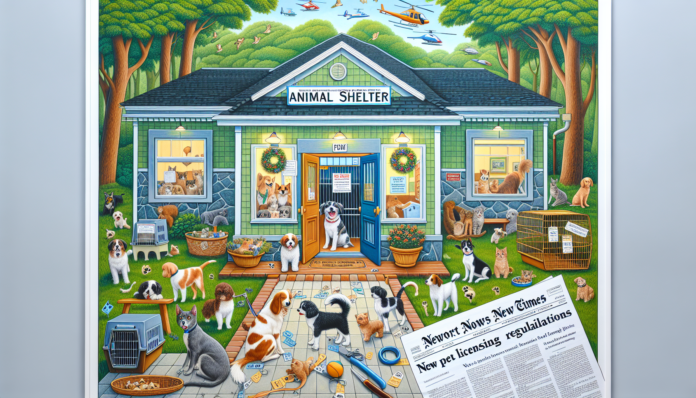Animal Shelter Announces Pet Licensing Changes: What You Need to Know
In a recent announcement that has caught the attention of pet owners and animal lovers alike, the Newport News Animal Shelter has unveiled significant changes to its pet licensing policies. These changes aim to enhance the welfare of animals in the community while ensuring responsible pet ownership. This article delves into the key aspects of the new licensing requirements, their implications for pet owners, and the broader impact on the community.
Understanding the New Licensing Requirements
The Newport News Animal Shelter has implemented a revised set of licensing requirements that will take effect immediately. One of the most notable changes is the introduction of a tiered licensing system based on the pet’s age, breed, and vaccination status. This system is designed to encourage responsible pet ownership by providing incentives for owners who keep their pets up-to-date on vaccinations and health checks.
Under the new regulations, pet owners will need to provide proof of vaccinations and spaying or neutering when applying for a license. This move is aimed at reducing the number of stray animals and promoting public health by ensuring that pets are vaccinated against common diseases.
Benefits of the New Licensing System
The changes to the pet licensing system are not just bureaucratic adjustments; they come with several benefits for both pets and their owners. Firstly, the tiered system offers reduced licensing fees for pets that are spayed or neutered and up-to-date on vaccinations. This financial incentive encourages responsible pet ownership and helps to mitigate the issue of pet overpopulation in the community.
Additionally, the new licensing requirements are expected to improve the overall health of pets in Newport News. By mandating vaccinations and regular health checks, the shelter aims to reduce the incidence of preventable diseases among the local pet population. This not only benefits the animals but also enhances public safety by minimizing the risk of zoonotic diseases—those that can be transmitted from animals to humans.
Community Engagement and Education
The Newport News Animal Shelter is committed to not only enforcing these new regulations but also educating the community about the importance of pet licensing. The shelter plans to host informational sessions and workshops to help pet owners understand the new requirements and the benefits of responsible pet ownership.
These educational initiatives will cover topics such as the importance of vaccinations, the benefits of spaying and neutering, and how to properly care for pets. By fostering a culture of responsible pet ownership, the shelter hopes to create a more informed community that prioritizes the welfare of animals.
Implications for Pet Owners
For pet owners, the new licensing changes may require some adjustments. Owners will need to ensure that their pets are up-to-date on vaccinations and consider spaying or neutering if they have not already done so. The shelter encourages pet owners to schedule regular veterinary visits to maintain their pets’ health and comply with the new licensing requirements.
Moreover, pet owners should be aware of the deadlines for renewing licenses and the potential penalties for non-compliance. The shelter has emphasized the importance of adhering to these new regulations to avoid fines and ensure that pets are legally licensed.
Conclusion: A Step Towards a Healthier Community
The Newport News Animal Shelter’s announcement of new pet licensing changes marks a significant step towards promoting responsible pet ownership and enhancing the welfare of animals in the community. By implementing a tiered licensing system, the shelter aims to incentivize pet owners to prioritize their pets’ health and well-being.
As the community adapts to these changes, it is crucial for pet owners to stay informed and engaged. With the support of the Newport News Animal Shelter and a commitment to responsible pet ownership, the community can work together to create a safer and healthier environment for both pets and their human companions.
